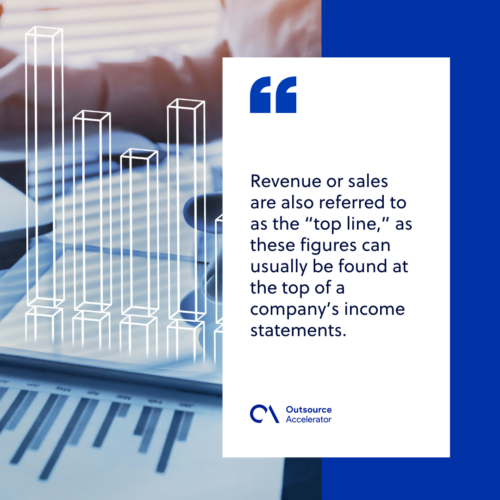Revenue vs. income vs. profit: A quick review

As each year draws to a close, companies often clamor to do their yearly reports. They hope to see outstanding metrics at the end of the fiscal year.
Three of those metrics are revenue, income, and profit, which is arguably the most important factors to running a business. They may look the same to the untrained eye and are sometimes used interchangeably.
However, revenue vs. income vs. profit have crucial differences that everyone in business should be aware of.
Revenue vs. income vs. profit: What is revenue?
At its core, revenue is the total figure that an individual or business earns from selling goods and services. It’s the money that comes from consumers that purchase a service or product, otherwise known as sales.
Revenue or sales are also referred to as the “top line,” as these figures can usually be found at the top of a company’s income statements.
When it comes to generating revenue, marketing tactics have to be in motion. For instance, marketing can expand business reach to social media to advertise a new product in time for the rollout.
Revenue vs. income vs. profit: What is income?
Income refers to the amount that businesses earn from selling goods, products, or services.
There are two types of income: net and gross. Businesses have different figures for these as one states the total figure of sales, while the other reflects the amount after taxes, losses, and other deductions.

Revenue vs. income vs. profit: What is profit?
Profit is what’s left once the bills are paid and planned expenses are taken care of.
For businesses, this means that after paying taxes, overhead costs, and paychecks, whatever is left in the cash register is the profit.
Just like income, there is also a net and gross amount for the profits. According to Zoho Books, the net reflects the amount after all business expenses have been paid off, while the gross profit is what’s left after deducting the costs of products sold.
The differences between revenue vs. income vs. profit
To illustrate the difference between revenue vs. income vs. profit — in a business, their main income comes from the products and services they offer and sell to their customers. The total cost of goods sold (COGS) is deducted from the sales they have made to get the profit.
Lastly, revenue is calculated by multiplying the number of products and services sold and the set price of each.
To make things easier to digest, here’s a nifty table to help differentiate between revenue vs. income vs. profit.
| Revenue | Income | Profit | |
| Definition | The total figure that an individual or a business earns from selling goods and services. | The earnings of an individual or a company that comes from working and conducting business in a period of time. | The sum of the figures after the revenue has costs and expenses have been deducted. |
| Differences | Depends solely on sales activity. | Depends on how many hours the individual worked or how the business was conducted. | Subdivided into gross and net profits. |
External factors that affect revenue, income, and profit
These factors are often out of one’s control and, unfortunately, can throw a curveball into your carefully laid out budget sheets.
Being mindful and ready of these is a way to take back a semblance of power over these circumstances.
Unexpected expenses
Calamities, repairs, price increases, and equipment failure are just few of the many root causes of unexpected expenses.
Emergencies can happen every day, and they won’t wait for anyone. Keeping a budget for emergencies is a must-have nowadays—even with comprehensive insurance.
Forecasting these expenses will save businesses from taking out unnecessary loans that can lead to more bills to pay.

Market trends
For businesses, market trends can make or break a good streak. Some days, the stores could be bustling with customers, and the phones would be ringing off the hook. But there will be instances when it would be quiet and slow.
Owners should be aware of sudden shifts and changes so that they can track when to order extra inventory and when not to.
Bookkeeping mistakes
Mistakes are inevitable, but there are certain measures you can take to ensure that they won’t happen regularly.
Bookkeeping mistakes are undoubtedly unavoidable yet they can be mitigated to a minimum. After all, they can affect a business’s budgetary figures on a somewhat major scale.







 Independent
Independent




